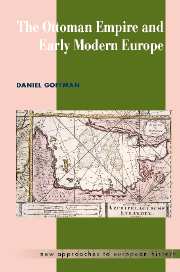Book contents
- Frontmatter
- Contents
- List of illustrations
- List of maps
- Preface
- Acknowledgements
- Note on usage
- Chronological table of events
- The Ottoman House through 1687
- 1 Introduction: Ottomancentrism and the West
- Part 1 State and society in the Ottoman world
- Part 2 The Ottoman Empire in the Mediterranean and European worlds
- Kubad in Venice
- 5 The Ottoman–Venetian association
- Kubad between worlds
- 6 Commerce and diasporas
- Kubad ransomed
- 7 A changing station in Europe
- 8 Conclusion: The Greater Western World
- Glossary
- Suggestions for further reading
- Index
- NEW APPROACHES TO EUROPEAN HISTORY
Kubad in Venice
from Part 2 - The Ottoman Empire in the Mediterranean and European worlds
Published online by Cambridge University Press: 05 June 2012
- Frontmatter
- Contents
- List of illustrations
- List of maps
- Preface
- Acknowledgements
- Note on usage
- Chronological table of events
- The Ottoman House through 1687
- 1 Introduction: Ottomancentrism and the West
- Part 1 State and society in the Ottoman world
- Part 2 The Ottoman Empire in the Mediterranean and European worlds
- Kubad in Venice
- 5 The Ottoman–Venetian association
- Kubad between worlds
- 6 Commerce and diasporas
- Kubad ransomed
- 7 A changing station in Europe
- 8 Conclusion: The Greater Western World
- Glossary
- Suggestions for further reading
- Index
- NEW APPROACHES TO EUROPEAN HISTORY
Summary
The Venetians have no king, but their form of rule is a commune. This means that they agree on a man whom they appoint to rule over them by their unanimous consent. The Venetians (Banādiqa) are called Finisin. Their emblem is a human figure with a face which they believed to be that of Mark, one of the Apostles. The man who rules over them comes from one of the noted families among them.
No one outside of the imperial council knew of Kubad Çavuş's secret instructions, and so he officially traveled to Venice as the representative not so much of his monarch or even his grand vizier, but of Joseph di Segura, an affluent and influential Jewish merchant of Istanbul. Kubad much resented having to travel in the company of di Segura's son to the capital of the mysterious Venetian Empire, particularly since the long-standing treaty between the two powers had not yet been renewed after Süleyman's death while on military campaign in Hungary. The envoy now knew that the Ottoman government might not extend the agreement but instead was considering an invasion of the Venetian colony of Cyprus. Should that occur the bailo certainly would spend the war in an Ottoman prison; was there any doubt that the Venetians would take advantage of Kubad's presence to retaliate?
After an uneventful three-week sea passage – including a brief layover on the island of Chios which only the previous year had embraced the Abode of Islam and where the envoy delivered an imperial firman directing the new commander of Chios town's stronghold to stop beleaguering the island's inhabitants with demands for money and services – Kubad disembarked at Venice in late October 1567.
- Type
- Chapter
- Information
- The Ottoman Empire and Early Modern Europe , pp. 131 - 136Publisher: Cambridge University PressPrint publication year: 2002



